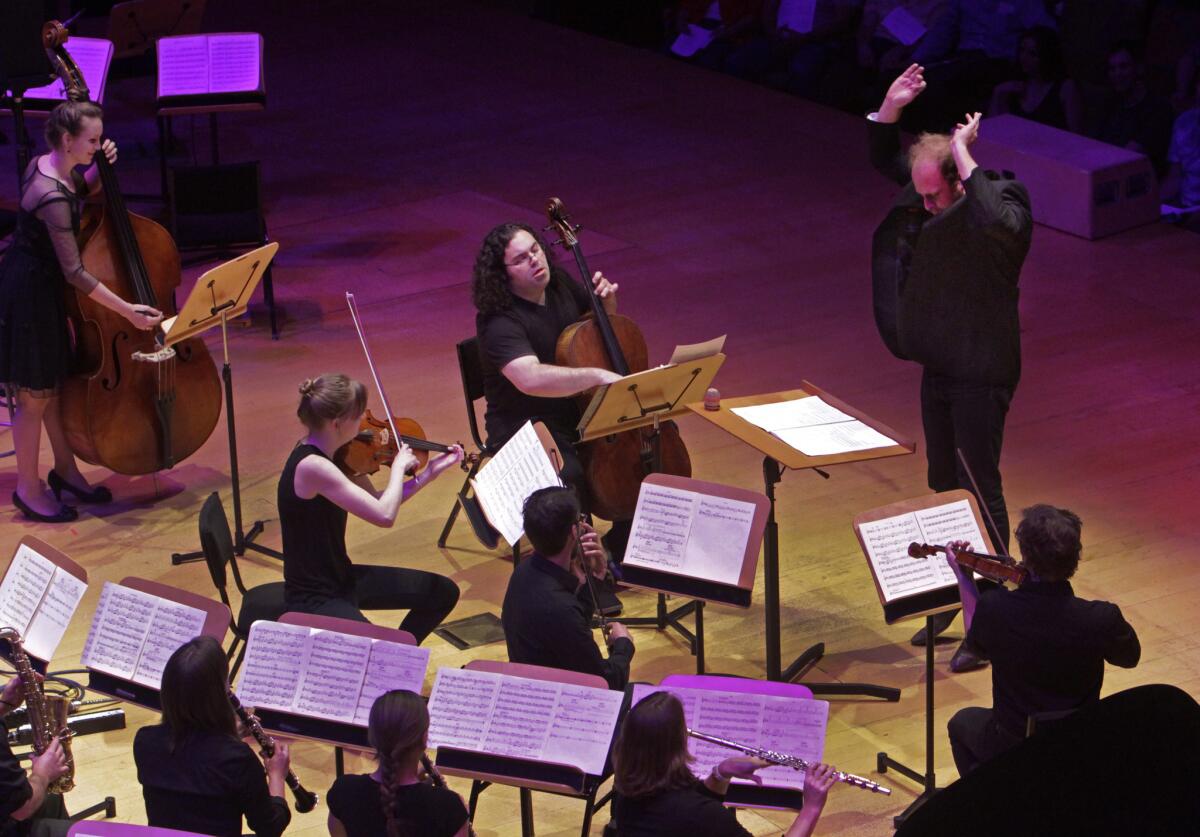Evening of tangerine dreams as wild Up makes its Santa Barbara debut

- Share via
SANTA BARBARA — The young Los Angeles new music ensemble wild Up, which is doing one of the better jobs anywhere of keeping classical music surprising and tantalizing, made its Santa Barbara debut Saturday night at the sedate and well-tended Music Academy of the West.
The weather was delightful, and the evening included the trappings of a swank celebration of endless summer on a well-tended estate in the hills of exclusive Montecito overlooking the ocean. Mimosas were served outdoors before the program began, while soothing surfer music played in the background. Inside Hahn Hall were the easygoing pleasures of a Satie “Gymnopédie,” a little rumba, a little this and that, including something from Esquivel’s ‘60s novelty Space Age bachelor pad music. The agreeable smell of local oranges wafted through the premises as fresh juice was made onstage during the performance.
This collective of young musicians formed by conductor Christopher Rountree has come a long way in the four short years since it began playing in grungy Echo Park clubs to crowds almost exclusively under 30. This audience was older and well heeled. Presented by UC Santa Barbara’s Arts & Lectures group, the program was part of a traditional chamber music series.
But the only thing traditional about the concert was the superb playing.
That opening outdoor background surf music was Art Jarvinen’s “Endless Bummer” for electric guitar and electric bass. The two guitarists, dressed in white, had floral patterns projected on them and on a screen behind, making them seem to radiate out of the shrubbery. Their Minimalist twanging proved hypnotic, and so was the weird scene hinting that things might not turn out as they seemed.
Inside, attendees scrunched past players all over the hall playing Satie’s “Furniture Music,” music meant to be ignored but, once more, impossible to do so. As musicians gradually walked onstage still playing, that segued into Jodie Landau’s surfer-esque arrangement of Satie’s soothing piano “Gymnopédie No. 1.” A crashing conclusion led to another segue — John Zorn’s “for your eyes only,” in which every few seconds, there was a different kind of music.
There were also visuals, created by chromatic. The feisty young L.A. collective will have a major classical music presence when it collaborates with the Los Angeles Philharmonic at Disney Hall in January on a staging of Beethoven’s Missa Solemnis and in February when it participates in a new production of John Adams’ “A Flowering Tree” at Opera Omaha.
On sheets behind the Hahn Hall stage, chromatic projected videos of players hanging out on the balcony, eating popcorn or juggling oranges.
The orange theme came from a new work by Chris Kallmyer, a versatile wild Up member (trumpet, guitar and bass), called “amplified orange juice, a louder remembering.” With an amplified knife, he cut oranges onstage and put them in an amplified blender, all the while recounting how he came upon the appliance. Made in 1947, the blender happened to belong to Calvin Simmons, a rising African American conductor who had been an assistant conductor of the L.A. Phil in the ‘70s but who drowned at age 32 in 1982.
Citrus began to take on new meaning. You couldn’t escape its freshness. Tangerines were handed out to members of the audience in paper bags at intermission.
The key to all this was the program’s title, “Pulp.” Oranges have pulp. Pulp serves in popular culture as a vehicle for unthinking pleasure. The arrangement of Esquival’s lounge music by violinist Andrew Tholl celebrated more of that, as did, in a far more seductively refined fashion, young L.A. composer Julia Holter in her “Endless Song for the End of Summer.”
But pulp is also a term of aggression. John Zorn’s “A Rebours,” a cello concerto given a compellingly, vehemently virtuosic performance by wild Up cellist Derek Stein, came to seem almost a memorial for Simmons, whose shockingly early death came in a boating accident.
The final work, “a new anxiety” by Nicholas Deyoe, was violently loud. Earplugs were handed out, although I didn’t notice anyone using them. Ferocious climaxes, composed of complex, raw instrumental textures, were too compelling to dull. Video accompaniment showed the oranges sliced, smushed, their juice flowing like blood.
All the performances, led by Rountree, were exceptional, the ensemble turning on an astonishing stylistic dime. This group really has come a long way — technically, intellectually, emotionally and technologically. I worry about the future of Southern California citrus in a future of climate change, but on Saturday night, the future of classical music — of all music — seemed in the right new hands.
More to Read
The biggest entertainment stories
Get our big stories about Hollywood, film, television, music, arts, culture and more right in your inbox as soon as they publish.
You may occasionally receive promotional content from the Los Angeles Times.











